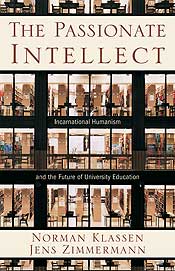 Last week Taylor University College hosted Dr. Jens Zimmermann from Trinity Western University as our speaker for our annual Faith & Culture Conference. The theme of this year’s conference was “Incarnational Humanism and the Christian University.” Most of the lectures touched on some aspect of what it means to be a student at a Christian university — many of his thoughts on this subject may be found in his just-published book (with Norman Klassen), The Passionate Intellect: Incarnational Humanism and the Future of University Education (Baker Academic, 2006; Buy from Amazon.ca | Buy from Amazon.com). I would highly recommend this book for students and professors — and not only those at Christian liberal arts universities.
Last week Taylor University College hosted Dr. Jens Zimmermann from Trinity Western University as our speaker for our annual Faith & Culture Conference. The theme of this year’s conference was “Incarnational Humanism and the Christian University.” Most of the lectures touched on some aspect of what it means to be a student at a Christian university — many of his thoughts on this subject may be found in his just-published book (with Norman Klassen), The Passionate Intellect: Incarnational Humanism and the Future of University Education (Baker Academic, 2006; Buy from Amazon.ca | Buy from Amazon.com). I would highly recommend this book for students and professors — and not only those at Christian liberal arts universities.
The Thursday night public lecture was on the topic of religion and culture after secularism. In his lecture, entitled “Return of the gods? Faith and Intellectual Culture after Secularism,” Dr. Zimmermann tried to map out some of the concerns about culture currently shared by Christian and non-Christian thinkers and was a parade example of how Christians should think about culture.
In a nutshell, his lecture explored the demise of secularism and the resurgence of spirituality in Western culture. This resurgence is not uniform, nor is it in many cases associated with institutional religion. Rather, it is diverse and frequently appears under the label “spiritualityâ€? in a — sometimes deliberate — attempt to distinguish them from traditional, institutionalized religions. The question that Dr. Zimmerman raised is “What are we to make of this cultural development? More specifically he tackled the basic question of what the supposed exhaustion of secularism and the seemingly related return of religion into the public sphere, even into the very ivory towers of academia, actually means. In the first part of his presentation he described several causes for the demise of secularism and the resurgence of religion. He then tried to formulate a response from a religious, i.e., a broadly Christian perspective; this response is more a reflection on what is at stake in this current cultural development than it is a solution to the tensions we currently experience.
If this summary has piqued your interest, you may download and listen to the lecture for free. Just check out the Taylor Public Lecture Series on Religion & Culture web page here.

Is it just me or does this seem like a waste of time? Modernistic and Post-Modernistic spirituality has been been here a long time, either coming or going. Anyone familiar with the culture in which they live should have already dealt with it… In other words…this books seems like old news. Perhaps its the conclusion about what’s ahead that’s not.